
It's a truth universally acknowledged that those looking for good queer representation in the 90's and early 00's were, shall we say, willing to settle. While non-offensive or non-tokenizing rep certainly existed, it felt scarce enough that when it actually appeared the queston of whether or not the media it was in was any good took a backseat in priority.
In recent years, however, the publication of queer sci-fi and fantasy has been on an incline, and as readers we can be *gasp* discerning in our choice of queer lit. In celebration of the right to be needlessly picky, for Pride Month the Space Gaze team has brought you a collection of books that just, well, aren't our cup of tea.
Will they be yours though?
If you haven’t checked out Space Gaze before, take a look at our other installments here:

When there's nothing wrong with a book, but it's clearly oolong and you're in the mood for matcha.
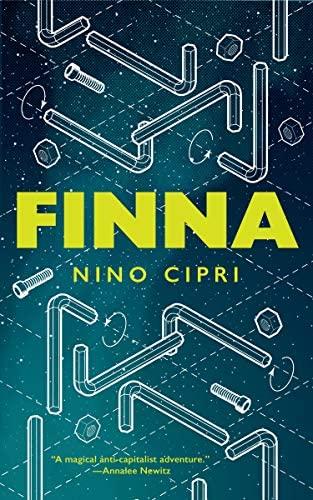
Rin: Oh, Finna. This is the one I’m most torn about. The beginning was so strong and the concept was so good—who doesn’t love the idea of stumbling upon portals to another dimension in their local IKEA?—but it had no staying power. It was short enough that I finished it, but I definitely started to lose interest about two thirds of the way through.
Rachael: Unfortunately, I’ve got to agree. To me, Finna seemed like a wonderful first draft for what could turn into a really cool book. Concept: fantastic. Characters: distinct, sympathetic, and interesting. Follow through: kinda lacking. Like Rin said, it’s short enough that it’s an easy read even if you’re not fully engaged, but I can’t help but wish it had more meat on its bones. As it is now, the second I turned the last page I thought, ‘huh, cool story’, and then promptly forgot the book existed at all.
Rin: I second all of the above. If you’ve read our other blogs, you’ll know by now that I struggle with novellas because they’re never as meaty as I want them to be. Finna wasn’t bad by any definition of the word, but it didn’t quite live up to the promised potential, at least for me.
Conclusion: If the concept grabs you (because, like us, you’ve worked retail and know how primed for horror that is), definitely try it out. Finna is a fun afternoon read; it just didn’t clear the bar set by most of the books we’ve read for Space Gaze. Not a bad novella, but not strong enough to be our cup of tea.
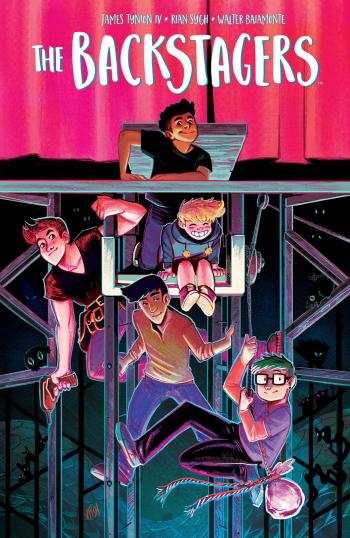
The Backstagers series by James Tynion IV [2017-2018]
Rae: So The Backstagers is… cute? It’s very cute. The characters are bright and sprightly and who doesn’t love a collection of nerds who band together against high school bullies and demons from a hidden dimension in the backstage dressing rooms? It’s a funny and lively graphic novel series and the only reason it’s 100% absolutely not my cup of tea is I’m pretty sure it’s written for elementary school kids.
Rin: Yeah, I had that problem reading through it. The characters are ostensibly in high school, but when one character looks like they’re nine and another looks like a fully grown man, and they’re supposed to be in the same grade—well, suspension of disbelief only goes so far. I also felt like it was really slow to start. Nothing about it grabbed me until literally the last panel, and that’s when I decided I would read the sequel as well.
Rae: Which officially makes you more invested than me since I stopped at one and haven’t looked back.
Conclusion: Fun book for younger readers. If you’re a fan of children’s books, theater stuff, or graphic novels, give it a shot. But it wasn’t our cup of tea.
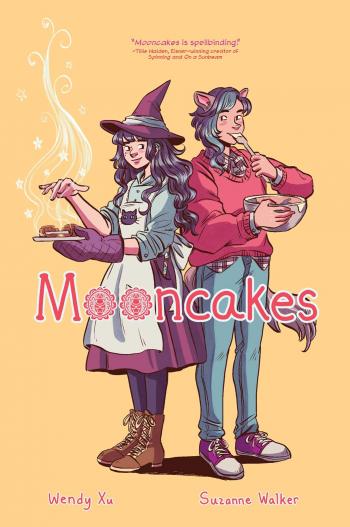
Mooncakes by Suzanne Walker [2019]
Rin: Mooncakes was… a slog. It’s a cute storyline, but about a hundred pages longer than it needs to be. 250(ish) pages is long for a graphic novel, especially one with a relatively low stakes storyline. Nova and Tam are really cute, but not much about this one grabbed me, including the art style, which is the most important part of a graphic novel for me.
Rae: Same. Cute. Light. Fluffy. The idea of a witch and a werewolf falling in love is fantastic and I really love the inclusion of deaf/HOH representation, but I had a hard time sticking with this one. Mooncakes seems to skim the surface of its own story, and nothing was ever developed or defined enough for me to have felt invested.
Rin: You’re right that it has a lot of potential, but it never quite got off the ground. And I definitely felt like the pacing was off most of the time—lingering too long on the slow scenes and skipping quickly through the action.
Conclusion: All in all, a sweet YA love story with magical elements, but it didn’t have enough depth for our tastes and it never got the pacing quite right. Not our cup of tea, but it might be yours.

Oof. Sometimes a book is so close to being good. But... there's that one issue you just can't look past.
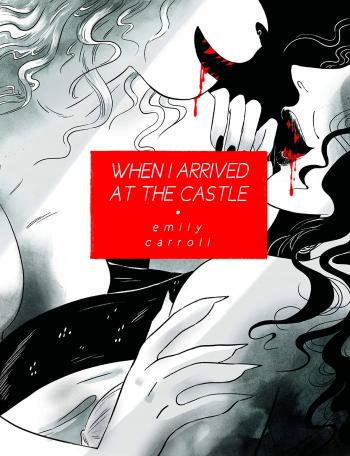
When I Arrived at the Castle by Emily Carroll [2019]
Rae: So I liked the artstyle of When I Arrived at the Castle. Very evocative. A great use of color to really pack a punch.
Rin: ...but?
Rae: But... unfortunately... the art was basically the only thing I liked about it. WIAatC is a short graphic novel -more of a one shot than an actual story- and I can’t say that I found myself very invested in any of it.
Rin: The red was gorgeous, but it also made an already gory story even gorier (and we all know how I feel about that at this point). I also have to say that I just didn’t… get what was going on. I had to look on Goodreads in order to figure out what The Point™ of the story was.
Rae: Oh The Point™. I can’t say I picked up on that too easily either. Is it that there’s a monster inside of all of us? Is it that the stories we tell ourselves about the past influence our future? Is it that creepy vampire ladies are hot? Who knows.
Rin: Was she even a vampire, though? I went into When I Arrived at the Castle knowing nothing and came out of it feeling like I knew even less. It probably has a lot of potential for people who are into horror-leaning graphic short stories (admittedly probably a pretty narrow market), but it definitely wasn’t for me. Pass.
Conclusion: Pretty pictures. About the right level of creepy (for one of us). But overall the downfall of When I Arrived at the Castle was a confusing choppy/storyline without enough character development to give it any weight or momentum.
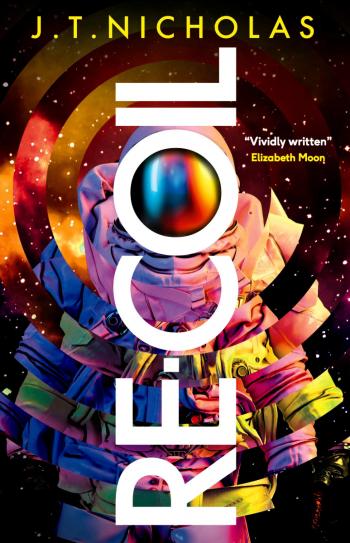
Re-Coil by J.T. Nicholas [2020]
Rin: The thing I liked most about Re-Coil was author’s take on sex vs gender. Even in a transhumanist future, there are times when your assigned body doesn’t match up with your internal sense of self, and the narrative is always respectful of that fact.
Rae: ...but?
Rin: But... pretty much everything covered in Re-Coil—minus the whole, get a new body every time you die thing—was already done by the Murderbot series, and Murderbot did it a whole lot better in a lot less space.
Rae: I’m never going to argue that Murderbot hasn’t done something better. I’m pretty sure I would vote Murderbot over Shakespeare in a head to head battle just because, let me say this for the fifth time or so in these reviews, I love Murderbot with my whole entire being. That being said, I think I got a little more out of Re-Coil than you did. While it’s certainly not the best sci-fi I’ve ever read, I found the action engaging, the world building intriguing, and the characters distinct enough to stand out. Especially a certain “urbane” gentleman who pops up halfway through.
Rin: Don’t even get me started on urbane. If I never have to read that word again it’ll be too soon. And I’m not saying it’s bad. It’s actually a pretty good book. But even though I finished it in two days it never truly grabbed me, and it fell into soap-boxing at times about the nature of humanity now that ~everything has changed.~ That’s not really my vibe.
Conclusion: Re-Coil did a lot of things well, but did none of them spectacularly. A solid B- sci-fi, it didn’t quite make the Space Gaze cut with its self-importance and occasional gender essentialism. We won’t tell you not to read it, but you’re probably better off reading Murderbot again instead.
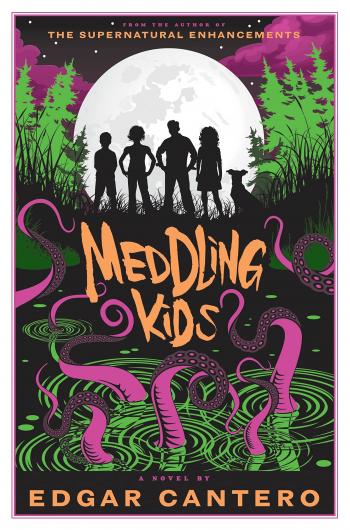
Meddling Kids by Edgar Cantero [2017]
Rae: Oh man I really liked some parts of Meddling Kids. I’m a huge fan of Scooby-Doo so an adult homage is absolutely right up my alley. The book is hilarious in some places, truly terrifying in others, and has some bomb lines scattered throughout. It 100% has the madcap thrill-ride elements I went in hoping for.
Rin: ...but?
Rae: But. There are some elements of the book that are, as I believe the kids say, Problematic. To not mince words, the author’s descriptions of Native Americans fall into some pretty stereotypical patterns. While we’re not reaching James Fenimore Cooper levels here, the lack of nuance, context, or (most importantly) main native characters makes the cliches glaringly obvious. It is an incredibly disappointing throughline in what could have been a joyful read.
Rin: I’m going to be honest with you: I didn’t finish Meddling Kids. Maybe that makes me a bad librarian, but it was a mix of all the things I don’t like in my media: horror, a skeevy take on a queer woman’s crush on another woman, and, as Rachael already mentioned, poor representation of a community that’s already poorly represented in most Anglo-American media. I also enjoy Scooby-Doo and I wanted to like this one, but I just couldn’t get past all of those things and finish the book.
Rae: Never feel guilty for putting down a book. There’s too many great ones out there to waste time on one that doesn’t speak to you. I didn’t personally read Andi’s crush as skeevy, but given Cantero’s other missteps here there’s definitely a possibility that I glossed over troubling aspects. I wish I could say the good aspects of this book outweighed the bad, but it’s hard when the bad are…. so very bad (*cough* the ending *cough*).
Conclusion: An incredibly mixed bag of a book, and one that will absolutely spark discussion. Depending on how much energy you have to critically engage with a troubling narrative though, it may not be worth the investment.

Or: the title we think the other person should probably never read. Like, ever.
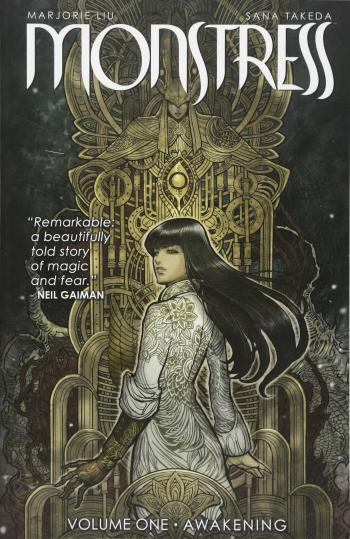
Monstress by Marjorie M. Liu [2016- ]
Rin, for the love of everything holy never read this book. You probably shouldn't even flip through it if we're being honest. Monstress is a graphic novel series that has received a huge amount of buzz, great reviews, interest, and love from the literary community. The art is fantastic and the story is compelling and cohesive. That being said, the subtitle of the first book shouldn't be 'awakening', it should be 'body horror and nightmares I will live with for the rest of my life'. This book is GORY and disturbing to the extreme. Admittedly, my tolerance for horror is set pretty low, but there were times I felt physically queasy reading the first volume. Seeing as your bar is set even lower, Rin, I'm going to go ahead and say you and this book would be a recipe for disaster. I know people who love this series (and if I happen to be looking at a panel without horrific imagery I can appreciate the art style), but if anyone wants to invest the time in reading this they need to be prepared for explicit torture, medical/body horror, dismemberment, and cannibalism. I couldn't handle it, and only made it through the first volume through sheer force of will (and felt real bad for a while afterwards). Rin, don't ever read this book.
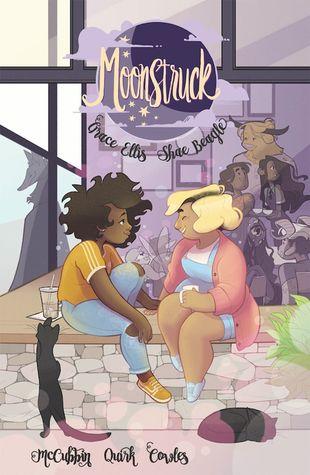
Moonstruck Vol 1: Magic To Brew by Grace Ellis [2018- ]
Well. My anit-rec certainly won't be as vehement as yours was—in part because I hardly ever read a book these days that you haven't recommended to me—but I'll still suggest you steer clear of this one, Rachael. It's got pretty much everything you won't like in a graphic novel: ditzy side characters (like The Backstagers), a really low stakes plot (like Mooncakes), and enough jumps that it's hard to follow the logic at times. I'll be honest, even I wasn't crazy about this one. There are definitely some positives: the art is pretty cute, the main character and her love interest are both queer women of color, and I adore worlds that blend modern tech with magic and magical creatures. But it just... didn't work for me, and I don't think it would work for you either. Save yourself the time and read something else you know you'll like.
Keep an eye out for our next installment of Space Gaze, where we'll get back to talking about books we actually enjoyed!
Rin: Probably.
Rae: Definitely! I have so many good ones in the bank and I've got to rant about them to someone.








